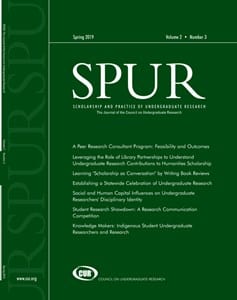SPUR (2019) 2 (3): https://doi.org/10.18833/spur/2/3/3
The Florida Undergraduate Research Conference (FURC) is an annual multidisciplinary conference that enables student scholars to present their research, network with other students, and attend professional development seminars. FURC has been held since 2011 and has featured more than 2,100 student presentations with participation from a broad array of institutions within the state. Survey data indicate that FURC is the first conference presentation for the majority of participants and that participation in the conference is associated with several positive outcomes. This article describes the history, structure, and planning of the conference and as well provides survey and outcome data that may assist other states and geographic areas as they consider forming their own conferences.
More Articles in this Issue
- Practice‐ Robert V. Reichle
SPUR (2019) 2 (3): https://doi.org/10.18833/spur/2/3/9 Abstract:Student researchers are rarely trained to explain their work to a general audience but must do so throughout their careers. To assist undergraduate researchers in building this skill, the Student Research Showdown—a research video and presentation competition—was created at the University of Texas at Austin. Students create brief videos on which their peers vote, and the top video creators face off with presentations and are awarded prizes by a panel of judges. Students reflect on their experiential learning as they construct a narrative that disseminates their findings, communicates impact, and serves as a sharable testament to their success. Indirect measures indicate that students improve their research communication skills by participating in this event.
- Practice‐ Shannon N. Davis and Sarah E. Wagner
SPUR (2019) 2 (3): https://doi.org/10.18833/spur/2/3/5 Abstract:Disciplinary identity, or connection to a particular academic discipline, is constructed through a developmental process across a scholar’s academic life course. Using unique data from an online survey of students at four different types of colleges and universities, this study investigates the extent to which disciplinary identity among undergraduate researchers is connected to their human and social capital and differs between social and natural scientists. Disciplinary identity for natural scientists is correlated with mentoring, being a first-generation student, and having a disability, whereas disciplinary identity for social scientists is correlated with only one factor: grit. Implications for institutions and undergraduate programs desiring to enhance the connection between students and their fields of study are discussed.
- Practice‐ Luciana Aenasoaie, Justin Joque, Amanda Peters, and Jamie Vander Broek
SPUR (2019) 2 (3): https://doi.org/10.18833/spur/2/3/1 Abstract:The library and the Undergraduate Research Opportunity Program at the University of Michigan partnered in an investigation of student-faculty research collaboration in the humanities. The authors found that providing early opportunities for undergraduates to collaborate on such projects was highly beneficial for both students and faculty mentors. Students contributed and gained invaluable skills in an experience they stated was more meaningful than that of a conventional classroom, whereas faculty mentors could juggle multiple projects, benefit from students’ technological skills, and articulate the salience of their research processes and their work. The authors also discuss the role of the library as a crucial catalyst in changing the perception of the humanities at higher education institutions, particularly as it exposes students to research projects and professions within the library.
- Perspectives‐ Sereana Naepi, Airini
SPUR (2019) 2 (3): https://doi.org/10.18833/spur/2/3/7 Abstract:As higher education institutions seek to provide further scope for diversity in their practices, there is space opening up for Indigenous undergraduate research. This article reflects on the Knowledge Makers program, an Indigenous undergraduate research initiative based in British Columbia, Canada. The Knowledge Makers program shows what is possible when an Indigenous approach is used to mentor Indigenous undergraduate students and offers promising practices for increasing Indigenous researchers and research, such as drawing on the knowledge of Indigenous ancestors, valuing Indigenous research methodologies, using a strengths-based approach, performing research as a type of service, and committing to legacy.
- Practice‐ Nicholas Rowland, Jeffrey A. Knapp, and Hailley Fargo
SPUR (2019) 2 (3): https://doi.org/10.18833/spur/2/3/6 Abstract:The ability of undergraduate students to write for scholarly audiences is contingent upon their capacity to recognize that scholarship is a kind of conversation. For a student, writing an academic book review is a near ideal yet generally underutilized opportunity to learn this lesson. Through analysis of previously published book reviews coproduced with students, the authors identify actionable practices to transform the process of writing book reviews from an undervalued, lone activity into a viable form of undergraduate research. Publishing coauthored book reviews may aid students seeking admission to graduate school and faculty seeking promotion. In the end, writing book reviews with students is an opportunity for faculty and librarians to pass along the important lesson that scholarship is an important, inclusive conversation.
- Assessment‐ Francisca Beer, Christine M. Hassija, Arturo Covarrubias-Paniagua, and Jeffrey M. Thompson
SPUR (2019) 2 (3): https://doi.org/10.18833/spur/2/3/4 Abstract:The authors discuss their study of the Peer Research Consultant (PRC) program at California State University, San Bernardino. During the 2016–2017 academic year, 13 courses, with 853 students enrolled, participated in the PRC program. Program participants completed pre and post-measures assessing demographic information, perceptions of skill level, and perceived gains following program participation. Students who participated in the PRC program showed an increase in overall course grades (M = 3.11) compared to those who did not (M = 2.82; p < 0.05). Similar findings were observed among under-represented minority (URM) students who participated (M = 3.05) and those who did not (M = 2.73, p < 0.05). Program participants reported high satisfaction with the program and improved confidence in skills


